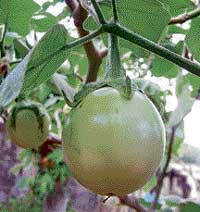 |
|
| |
‘Third war of independence averted’
|
|
| Dr P M Bhargava, one of the most unrelenting opponents of the commercial cultivation of Bt brinjal in India, believes that last week’s decision of the Centre makes the third war of Independence by India unnecessary. |

“The first war was in 1857 which we lost; the second one we won and got independence. We would have had to fight the third war of independence if Bt brinjal cultivation was given the go-ahead. We needn’t fight it now,” he said in an interview here.
Dr Bhargava, who was nominated to the biotech regulator, the Genetic Engineering Approval Committee by the Supreme Court, has been a vocal proponent of people-oriented science, research and policies. Founder of the Hyderabad-based pioneering Centre for Cellular and Molecular Biology, Dr Bhargava has been at the forefront of the fight against Bt crops and particularly Bt brinjal for the past few years.
He is all praise for Union Minister Jairam Ramesh, who he says showed ‘very rare courage’ in rejecting commercial cultivation of Bt brinjal.
“The decision is unparalleled and fantastic. His statement is extraordinary. It addresses all concerns voiced,” he said. The credit goes partly to Jairam and partly to the Ahmedabad-based Centre for Environment Education set up by the Sarabhai family that took the lead in the debate around Bt brinjal.
Asked about the message sent out to the world at large and especially to American MNCs that see India as a huge opportunity to exploit to fill their already overflowing coffers, Dr Bhargava said India has shown to the world that it would not be tied to the apron strings of the US or its MNCs. “We have shown the world that India takes decisions on the basis of the country’s interests,” he said.
Unity of vested interests
Does he agree that there is a nexus between vested American interests and the Indian establishment, Dr Bhargava said, “Nexus is certainly there... (between American MNCs and) a large section of politicians, bureaucrats and rich people whose commitment is not to the country but to make money.”
So, what are the implications of India’s decision? “It is a setback to irresponsible GM technology. People won’t get away with murder under the banner of GM. I am not saying all GM technology is bad considering its uses in medical field but in food and agriculture, a lot needs to be done before it is accepted.”
Dr Bhargava recommended that the GEAC and the technical committees such as Review Committee on Genetic Manipulation should be dissolved and in their place an independent committee be set up with people and experts who command credibility and have no vested interests in genetic engineering. To continue further research and long-term research that is needed to show up the impact of Bt technology on people, a network of organisations is needed considering that at present all tests are done by Monsanto and its affiliates like Mahyco. An extraordinary coalition that cut across political ideologies, social and economic thought and beliefs and affiliations came together to oppose Bt brinjal. “Clearly, we need to consolidate this network and work for the security and independence of India, setting aside party/narrow ideologies,” he said.
Biggest lesson
This chapter in India’s history has a few lessons for some among us, Dr Bhargava said. “The biggest lesson is that we showed up the people who are trying to sell our country. Another lesson is that in the end, truth always wins…In short, it is a declaration of India’s independence,” he said. |
|
|
|
|
|
|
|
|
|
|
 |
|
|
|
|
|
|
|




